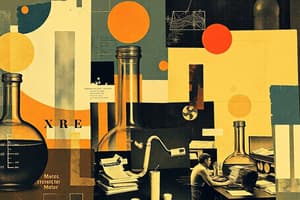Podcast
Questions and Answers
What are the states of matter that can be observed for a particular substance?
What are the states of matter that can be observed for a particular substance?
- Solid (correct)
- Gas (correct)
- Plasma (correct)
- Liquid (correct)
What does mass refer to?
What does mass refer to?
The amount of matter present in a sample
Which of the following can be considered matter?
Which of the following can be considered matter?
- Heat
- Light
- Air (correct)
- Electricity
Observing a physical property alters the chemical makeup of a substance.
Observing a physical property alters the chemical makeup of a substance.
What are two types of properties that substances can have?
What are two types of properties that substances can have?
Density, color, and _____ are examples of physical properties.
Density, color, and _____ are examples of physical properties.
Chemical reactivity changes when physical changes occur.
Chemical reactivity changes when physical changes occur.
Which of the following is a physical change?
Which of the following is a physical change?
What happens to a substance during a chemical change?
What happens to a substance during a chemical change?
Flashcards are hidden until you start studying
Study Notes
What is Chemistry?
- Study of characteristics, composition, and transformations of matter.
- Matter is defined as anything that possesses mass and occupies space.
- Encompasses all entities, both living (e.g., plants, bacteria) and nonliving (e.g., soil, air).
Properties of Matter
- Mass: Amount of matter in a sample.
- Physical Properties: Can be observed without changing the substance. Examples include:
- Density
- Color
- Melting point
- Solids, liquids, gases, plasma
- Chemical Properties: Describe composition and reactivity of matter, altering the substance upon observation.
States of Matter
- The state (solid, liquid, gas, plasma) of a particular substance is influenced by:
- Temperature
- Surrounding Pressure
- Strength of forces holding particles together
- Water can exist simultaneously in all three states (solid, liquid, gas).
Transformations of Matter
- Physical Changes: Alter physical properties without changing chemical composition. Examples include:
- Tearing paper
- Ice melting into water
- Water vaporizing into steam
- Chemical Changes: Involve changes in chemical properties, producing new substances during reactions.
Additional Concepts
- Extensive properties: Depend on the amount of matter present (e.g., mass, volume).
- Intensive properties: Do not depend on the amount of matter (e.g., density, color).
Studying That Suits You
Use AI to generate personalized quizzes and flashcards to suit your learning preferences.




